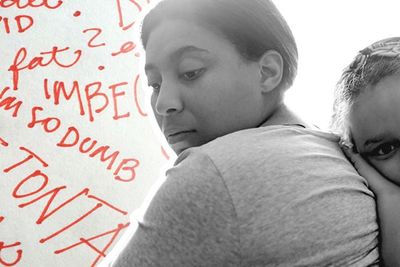Self-Image is a highly complex concept. From a very young age children are taught about things that are and aren't deemed “acceptable” in our society. This isn't inherently wrong of course.
The problem arises when the standards we set for our children are wrong in and of themselves. Self-image around bodies is notoriously manipulated and societal standards tell us that bodies must look a certain way to be "healthy." This is often a child's first experience with a negative body image.
if this hit home, I’m sorry and I’m here for you. and there too (IG:laetidecaru) #momanddaughter #dietculture #relatable #teenagers #weightloss
In Latino culture, making comments about another person's body is considered normal. It’s often disguised as concern coming from tias, moms, dads, etc. However, whether it comes from a place of concern or not doesn't matter; if someone makes negative comments about your body, like "estas gorda" or "te ves muy flaca," it’s going to affect a person's self image. When a child hears comments about their body coming from the people they love that affects how they perceive themselves, and it affects how they see other people.
The comments don’t have to be made directly to the child. When a parent heavily engages in diet culture or makes negative comments about their own body, that can lead a child to believe they should feel the same way and engage in the same habits. It’s important to think of who is listening when you begin to self-criticize, as these comments can oftentimes be just as damaging, or more damaging for the audience.
Growing up in a Latino household means you’ve probably heard of the family members who "estan a dieta." Dieting tends to be normalized, but according to experts, dieting is one of the strongest predictors for the development of an eating disorder. The problem also arises from adding morality to food, calling a burger "bad" and a "salad" good, when the truth is, food is just food with varying degrees of nutrients. This concept of categorizing what you eat can quickly lead to disordered eating, as the guilt of consuming “bad” food can cause punishing behavior.
The sad reality is that parents who engage in negative self-talk and negative body image are victims of diet culture themselves. We’ve normalized wearing fajas on the daily, shapewear and slimming drinks taking up large spaces in our homes and budgets. We’ve invested so much into improving the things we don’t like about ourselves, that we aren’t taking time to celebrate the things we do.
So what can we do about it? Sure this kind of behavior has been largely normalized in Latino culture, but just because it’s something that is considered common, it doesn't mean we have to accept it. The community can repeat healthy self-accepting messages that highlight that there isn’t just one way to be and look healthy. We must unlearn bad habits of commenting on others’ physique, and learn to accept ourselves as we are, understanding that there cannot be an “imperfection” if there is no standard of perfection.
Self-care involves a holistic approach of accepting the things you don’t like about yourself instead of always looking to change something, and focusing on the many things you do like about yourself.If you or someone you love is suffering from an eating disorder, seek professional help. To start, you can find resources here.
